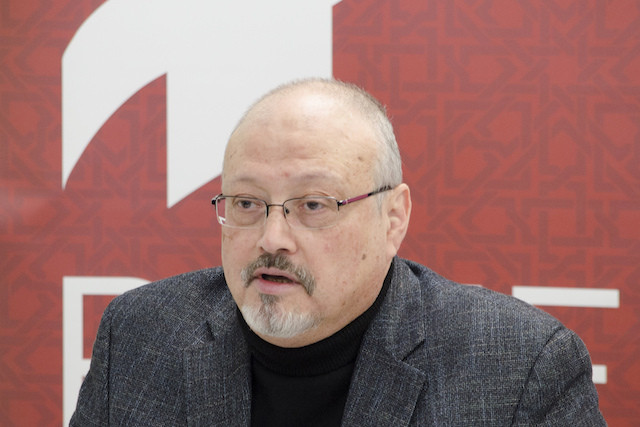After six days of silence from the Trump administration amid reports that Khashoggi may have been abducted or killed by the Saudi regime, the secretary of state, Mike Pompeo, issued a statement saying senior US diplomats had spoken to their Saudi counterparts about the case.
“We call on the government of Saudi Arabia to support a thorough investigation of Mr Khashoggi’s disappearance and to be transparent about the results of that investigation,” Pompeo said.
A few hours earlier, Vice President Mike Pence he said he was “deeply troubled” and warning that “the free world deserves answers”.
Donald Trump’s own remarks to reporters were more tentative, saying he was “concerned” about “some pretty bad stories” about what had happened to Khashoggi.
“Hopefully that will sort itself out,” the president said but added: “Right now nobody knows anything about it.”
Other western allies increased the pressure on Riyadh which has claimed that Khashoggi had left the Istanbul alive, a claim questioned by Turkish officials.
The UK foreign office said reports Khashoggi was abducted or killed by the Saudi government were “extremely serious allegations”. The French foreign ministry said Khashoggi was “a recognised and respected Saudi figure”.
Khashoggi is a US resident and a contributor to the Washington Post, but until Monday afternoon, the state department had stuck to a low-key response, offering only a single-line comment on Khashoggi’s disappearance that said: “We are not in a position to confirm these reports, but we are closely following the situation.”
Bob Corker, the Republican chair of the Senate foreign relations committee, took the lead in issuing a strongly worded statement.
“I have raised Jamal’s disappearance personally with the Saudi ambassador, and while we await more information, know we will respond accordingly to any state that targets journalists abroad,” Corker wrote on Twitter.
The White House reaction ultimately came in the form of a tweet from Pence, saying he was “deeply troubled to hear reports about Saudi Arabian journalist Jamal Khashoggi.
“If true, this is a tragic day. Violence against journalists across the globe is a threat to freedom of the press & human rights. The free world deserves answers,” the vice president said.
The Trump family – in particular the president’s son-in-law, Jared Kushner – has established a close bond with Saudi crown prince Mohammed bin Salman.
In March 2017, Trump hosted “MBS” at the White House, breaking protocol to do so as the Saudi was only a deputy crown prince at the time. The president made Riyadh the destination of his first foreign trip and backed the Saudi royals wholeheartedly in their standoff with the Qataris.
The secretary of state, Mike Pompeo, was last month reported to have overruled his own top advisers to approve the continued supply of arms to Saudi Arabia for its campaign in Yemen, despite the high civilian death toll from aerial bombardment.
Pompeo’s predecessor, Rex Tillerson, downgraded the role of pursuing human rights in the state department’s mission. Pompeo has addressed human rights selectively, concentrating on abuses in Iran and Venezuela.
Trump has boasted of his strong relationship with his Turkish counterpart, Recep Tayyip Erdoğan, who on Monday demanded that the Saudi monarchy prove Khashoggi left its consulate in Istanbul as Riyadh has claimed. But the relationship has soured over the Turkish detention of an American pastor and Ankara’s decision to buy a Russian anti-aircraft system.
The US has no ambassador in either Riyadh or Ankara.
“Normally we’d also have an ambassador in Saudi Arabia. We don’t. Getting on the phone and having quiet conversations to see if you can get any answers is one way to get it, but we’re not getting any answers,” Ivo Daalder, the former US envoy to Nato, told CNN.
Julian Borger in Washington
